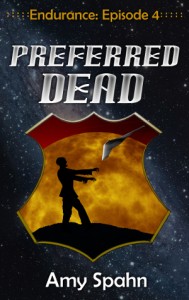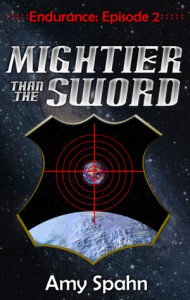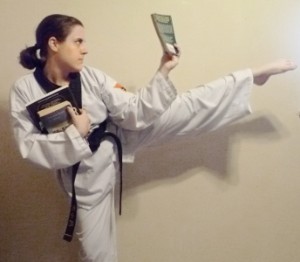Today, I’m delighted to welcome Amy C. Spahn to Virtual Book Club, an interview series in which I put questions to authors about their latest releases. If you would like to pose a question, you’ll have the opportunity to do so at the end, or she is willing to Skype into book clubs.
When asked how she sees world, Amy C. Spahn replies that it’s a collection of riddles waiting to be solved and she applies herself to this task with sometimes alarming dedication.
An avid martial artist, Amy likes to break pieces of wood with her forehead. She advocates intellectualism, introversion, and learning something new every day. Her Amazon wish list looks like she’s preparing for a life of crime, but she’s really not. She’s just an author.
Amy writes character-driven stories involving swords, spaceships, or superpowers. She’s fascinated by characters who expose the darkness inside all of us, but who also make us laugh.
She, her husband, and their cat spend their time staring at little markings on paper and pretending that takes them to another world. Sometimes they do the same with pixels on a screen. It’s either magic, or insanity. Probably both.
As a sideline, Amy critiques fictional fight scenes. In case you missed it, here is her critique of Shamayal’s fight from my novel, A Funeral for an Owl.
The focus of today’s interview is her new release Preferred Dead (Endurance Book 4)
Q: Most writers have refined their own daily rituals. Some need silence, others like the buzz of a coffee shop, the rumble of a train or their favourite music. What are your essentials?
I have a few Pandora stations I use when writing. Audiomachine and Within Temptation are two favourites. I like driving beats with strings, particularly cellos and violins, carrying the voice of the music. I find that music that puts me a little on edge tends to improve the speed and coherence of my writing. For the same reason, I try to be slightly too cold or slightly hungry or some other form of minor discomfort when writing.
Q: What can readers expect from your writing?
I like to alternate between humour and soul-crushing despair. Some of my pieces range far to one side or the other, while others mix the two. My Endurance series of science fiction novellas has been described as a blend between Star Trek and The Office – weird co-workers in space. Those are definitely on the lighter side of the spectrum. On the other hand, a horror short I’m trying to sell at the moment features the fun topic of being the last person alive on Earth.
Almost everything I write has some futuristic or supernatural element to it, but I do my best to create believable sci-fi/fantasy components. I like magic systems with definite origins and rules, and science that sticks as close to a modern understanding of physics as possible.

Click here to buy or look inside
“Once again the Endurance crew delivers a laugh-out-loud, yet suspenseful adventure. The perfect blend of classic science fiction tropes and modern sitcom humour.”
Q: Tell us a little about the major areas you have had to research for Preferred Dead.
I consulted with a medical professional to craft realistic explanations for how people could be revived after having been medically dead for several months. Obviously this capability doesn’t exist in modern medicine, but with a few details about cell membranes and oxygen production, we were able to create descriptions that should uphold suspension of disbelief.
My husband is an aerospace engineer, so I’ve relied on his input when describing aerial manoeuvres and futuristic transportation. Preferred Dead includes his input on the chemical properties of composite materials.
For a fantasy novel I’m pitching right now, I incorporated my college minor of linguistics in creating the magic system and did some major research on lock picking. I actually bought a few dummy locks and a picking set, read a book about the technique, and then spent several hours trying to pick different kinds of locks so I could accurately describe the feel. The first time I picked a pin-and-tumbler and felt that satisfying click as the mechanism sprang open, I gained a much better idea of how to describe it. I’ve gotten to the point where I can pick a pair of handcuffs with a bobby pin. While I hope I never have reason to use that particular skill, it’s a good bet one of my characters will do so in the future.
Q: Regardless of genre, what are the elements that you think make a great novel? Did you consciously ensure all of these were in place?
Characters who change make a great novel. I can enjoy reading just about any genre as long as it features a character who goes through some sort of internal transformation via emotional and/or physical struggles.
Good novels have to include pain. Pain is the great motivator – it forces us to change our behaviour. When there isn’t enough pain in a story, the character’s transformation rings false. This doesn’t have to be nail-biting anguish or hospital-worthy injuries, but the pain does need to be there.
Lastly, when I start reading a book, I need to have a sense of “why” within the first few pages. Why should I read this? What am I going to get out of it? Am I going to laugh? Am I going to feel suspense? is it going to make me think?
Preferred Dead is very character-focused. While it’s a comedy and so the pain is mostly situational and used for humour, two of the protagonists make significant life choices by the end and another discovers his own fallibility. The big “why” of these stories is amusement. They’re short and fun, intended as a brain break for those without a lot of time to read, or as an easy point of entry into sci-fi for readers who aren’t comfortable with the genre.
Q: So we have an idea where you’re coming from, name your top five authors.
Jim Butcher, Italo Calvino, William Faulkner, Michael Connelly, and the fifth one changes several times a year depending on which book impressed me most recently. At the moment it’s William Vollmann, author of The Dying Grass.

Click here to buy or look inside
Q: Do you have a method for creating your characters’ names, and what do you think makes a name believable?
I studied linguistics at university, so when I’m creating names for aliens or fantasy characters, I try to work from their society’s underlying language. What kinds of sounds do they use? What sound combinations are allowed or considered unpronounceable?
If you trace names back far enough, all of them are rooted in basic words: things in nature, jobs, personality traits, etc. (My last name, Spahn, used to mean roofer.) So naming a character can often give you a bit of their family’s ancient background as well.
For modern first names, it’s far less complicated. I pick a name I like that I haven’t used in another story and roll with it.
Q: Do you find yourself returning to any recurring themes within your writing and, if so, are you any closer to finding an answer?
I love exploring the frailty of the human spirit and discovering the point at which it breaks.
Er, that kind of makes me sound like a sociopath.
Let me explain.
I think we write fiction to test ourselves. We put characters through situations we ourselves will never experience, for the purpose of seeing how those situations change them and whether or not they make it through.
For me, one of the most interesting kinds of breakage is when a previously sympathetic character crosses a moral line. I’m fascinated by the fuzzy grey area of right and wrong and the stimuli that will force people to jump from one side to the other. My favourite characters to read and write are those who straddle the fence.
I also write a lot about highly intelligent characters who have trouble conforming with societal norms. Intellect can be an isolating trait, and I enjoy exploring the fight to fit in without sacrificing one’s own standards.
I’ve found several answers to these issues, but I expect there are more.
Q: How do you cope with the self-doubt that seems to plague the creative process?
Crying, chocolate and nagging my husband for positive feedback.
Just kidding.
Actually, no, that’s completely accurate.
In all seriousness, almost every successful author struggled through periods of self-doubt and failure, and I find encouragement in reading their stories.

Click here to buy or look inside
Q: Have you had any rejections that have inspired or motivated you?
When I started submitting my work to agents and magazines, I knew I would be amassing a number of rejections. To take the sting out of it, I created a Humility Binder, into which I put a printout of every rejection I receive. My goal is to fill the binder, so each rejection still feels like progress. Doing this gives me a tangible reminder that every failure is a step toward success.
The flip side of the binder is my Boo-Yah Binder, where I put acceptances, requests for full manuscripts, and encouraging rejections. Obviously this side is a lot smaller than the Humility side, but it helps balance out my perspective.
Q: Do you like to give your readers a twist at the end?
If a story begins, progresses, and ends without anything surprising happening, I tend to come away disappointed. I like stories with multiple levels of twists, scattered throughout the novel rather than clustered at the end, and I try to write that way as well. This gives a feel of inevitability to the final twists and mitigates the risk of them seeming superfluous.
Q: What are you working on at the moment?
I’m planning the final installment of the Endurance series and hoping to release it next spring. In longer works, I’m drafting a novel exploring the way writing interacts with the story it’s telling. I also usually have a couple short stories at any given time, but those tend to turn over quickly. Right now I’m editing a sci-fi short set on a planet I made up as a hobby and kept embellishing until it had a sprawling and detailed culture. To justify all the effort I’ve put into developing it, I figured I ought to write something about it.
Q: Assuming you allow yourself any time off, what do you do when you’re not writing? Any hobbies or party tricks you’d like to share?
I break pieces of wood with my forehead. I’ve been doing martial arts for five years now, focusing on Eskrima (Filipino stick fighting), Isshin-ryu Karate, and Tang Soo Do, in which I earned my black belt about a year ago. I also dabble in Brazilian Jiu-Jitsu, and I love incorporating various moves from these arts into my writing.

For a quite literal party trick, I make balloon animals. It was just something I thought would be fun to learn, so I bought a pump and watched some online tutorials.
I tend to get really interested in a particular hobby (baking, sewing, cryptography, lockpicking, etc.) and do a bunch of research on it. Once I feel I understand the overall paradigm of that hobby, I’ll usually move on to something else. A few have staying power and become lifelong activities, but usually my side hobby changes every couple months. Right now it’s crafting fake floral decorations.
On the employment side, I run a small typing and editing company working with first-time novelists, business book authors, and people writing their memoirs. We coach inexperienced authors through the writing process to help them avoid the most common pitfalls and ensure they reach that elusive final draft.
Want to find out more about Amy’s work or connect with her?
Visit her website or her Amazon Author Page or follow her on Twitter
Remember, if you enjoyed this post please share it. If there’s anything else you’d like to ask Amy, leave a comment.
To have future posts delivered directly to your in-box, visit the sidebar on the right and subscribe to my blog, or to find out about new releases, competitions and freebies, subscribe to my newsletter and grab your free copy of my novel, I Stopped Time.
And if you’re an author and would like to appear on Virtual Book Club, please fill in a contact form.



3 comments
Thank you for the introduction to Amy Spahn, who is a new-to-me author. Her books sound very interesting. Her responses to your questions seemed thoughtful and insightful and I enjoyed the interview immensely.
Yes, Amy is an author who tempts me to read outside my comfort zone.
Thanks for hosting me on your blog, Jane!